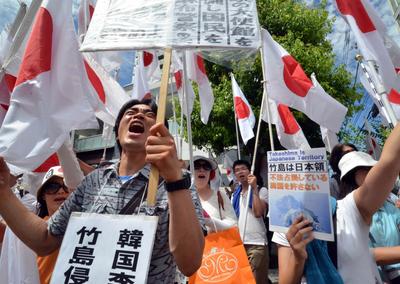Japan-South Korea relations are souring again over the issue of “comfort women,” who were forced to provide sex to Japanese soldiers before and during World War II.
What opened up the discord was South Korean President Lee Myung-bak’s comment that he landed on one of the disputed Takeshima islets on Aug. 10 because the Japanese government had made no progress on the comfort women issue despite Seoul’s demand for compensation.
The islets in the Sea of Japan, controlled by South Korea, are claimed by Japan.
In response, Prime Minister Yoshihiko Noda told a Diet committee this month that the government could not confirm the existence of documents that showed that the women were taken by force. South Koreans took his remarks as a distortion of history, and protests are spreading across South Korea.
We wonder if it was appropriate for Lee, as president, to incite nationalism by bringing up disagreements on the question of history.
But Japanese politicians are also at fault in the way they have dealt with the issue.
In particular, we cannot ignore comments by some politicians, including Jin Matsubara, chairman of the National Public Safety Commission, and former Prime Minister Shinzo Abe, calling for a re-examination of the 1993 statement released by then Chief Cabinet Secretary Yohei Kono on the comfort women issue.
Based on various documents and testimonies, the government admitted in the Kono statement that the Japanese military was broadly involved in the establishment of comfort stations and management of comfort women. The statement offered an apology and reflection of the Japanese government.
It is an irrefutable fact that many women were deprived of their physical and mental freedom and had their honor and dignity violated.
Matsubara and others cited the absence of documents pointing to coercion in their calls for the re-examination of the Kono statement. We believe their argument is tantamount to failing to see the trunk for the branches.
There is also something we want the South Korean people to understand.
In response to the Kono statement, the Japanese government took the initiative to set up the Asian Women’s Fund jointly with the private sector in 1995. The fund, collecting contributions from the public, offered compensation to the victims with a letter of apology signed by successive prime ministers.
It is extremely regrettable that many South Koreans are unaware of these acts.
Yet some Japanese politicians have been repeatedly making comments as if to deny the Japanese government’s stance. Under such circumstances, Japanese prime ministers’ apologies, no matter how sincere, are viewed with skepticism.
Five years ago, Abe, as prime minister, stated that there was no “coercion in the narrow sense,” that authorities did not take away women by force like an abductor.
Later, U.S. Congress and the European Parliament adopted resolutions demanding the Japanese government apologize for the comfort women issue, describing it as “one of the largest cases of human trafficking in the 20th century.”
It was a warning by international society against Japanese politicians who are still unable to squarely face the mistakes Japan made in the past.
Can the politicians demanding the re-examination of the Kono statement repeat their comments in South Korea, Europe and the United States?
Noda should avoid making comments that cause misunderstanding and once again make clear to audiences both at home and abroad his determination to follow the Kono statement.
-- The Asahi Shimbun, Aug. 31
It's relieving that there are people who are conscientious and smart enough to admit what's wrong in Japan...
